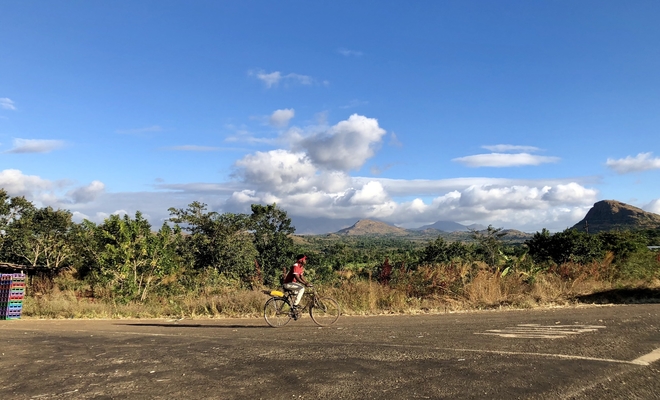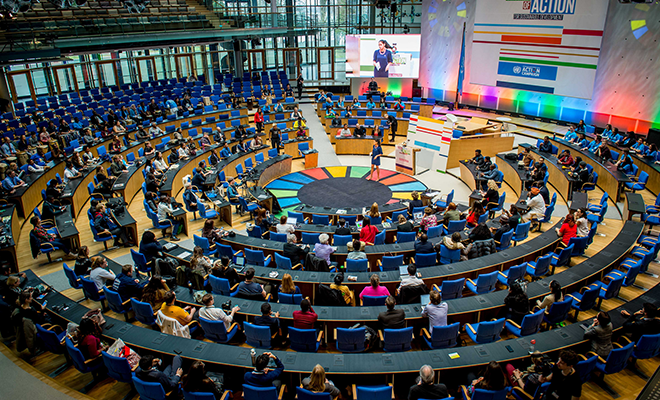I was teaching in Malawi a few weeks ago when I accepted an invitation to participate in a debate on the environmental footprint of population growth hosted by The Norwegian Academy of Science and Letters. Although I had not explicitly worked on population policy, I was intrigued by the prospect of better understanding why population is often a neglected area in the mainstream climate change discourse. And the thought of engaging with an Earth Systems scientist and a philosopher was much too good to pass. I was also intrigued by the fact that population control is not explicitly mentioned in the SDGs.
News - Page 4
Malawi is an illustrative example of the challenges that low-income countries face as they try to make themselves attractive for aid agencies, international institutions and private sector actors in the quest to promote development and reduce poverty.
UN Deputy Secretary-General Amina J. Mohammed recently visited the University of Oslo to address the current achievements and challenges of the 2030 Agenda, in a public lecture jointly organized by the Oslo SDG Initiative and UNDP Norway.
A recent report – Spotlight on Sustainable Development 2018 – published by a group of civil society organizations discusses new policy pathways for a more effective implementation of the 2030 Agenda. It highlights the need to redefine policies for sustainable development and ways of overcoming contradictions in the implementation of the 2030 Agenda.
An estimated 38 million people in the world today are vulnerable to famine and 815 million suffer from various forms of hunger. No country epitomizes the hunger challenge better than India. The country's much touted success in preventing famine due to democratic political institutions (as famously argued by the Nobel laureate Amartya Sen) has not been replicated in the field of chronic hunger, which remains a major concern and affects large groups in the population.
Three years have elapsed since the introduction of the 2030 Agenda and the Sustainable Development Goals (SDGs) on the world stage. This summer, I interacted with UN and World Bank officials, country representatives, academics, civil society organizations and numerous think tanks. My goal was to better understand the current status of policymaking and implementation of the SDGs at global, national and local levels. Here is a brief overview of what I found.
Has the 2030 Agenda really changed the way politics work? And, how do concepts change practices?
Whenever the 2030 Agenda and the Sustainable Development Goals (SDGs) are discussed, we usually hear the same refrain: this is a new way of thinking about development! The language of donors and recipients is passé; we are all developing countries now; we are all in the same boat; this is a universal approach to development, and so on. Although rhetorically effective, these expressions beg the question of whether the change is primarily an ideational revision, or whether it is actually changing politics. To put it more bluntly: Is the 2030 Agenda mainly changing semantics, or is it changing practice?
A persistent complaint among many developing country leaders is the poor state of their roads and how the international community appears reluctant to invest in infrastructure development. China has the solution, or so it claims. Launched in 2013, the ambitious Belt and Road Initiative, estimated to cost over $5 trillion, aims at global investments in transportation, infrastructure, telecommunications, logistics, energy, and oil and gas. But will it help promote the SDGs? And is it all win-win?
One my recent trips to Malawi, I have noticed a growing amount of interest and attention on the leadership question. Many scholars, journalists, students, political commentators, activists and even politicians are now openly talking about the new breed of leaders the country needs to jumpstart development and help reduce poverty. There is also considerable talk of how Malawi should emulate Rwanda, which a growing number of Africans consider to be a beacon of hope in a continent that longs for rapid economic growth, more equitable distribution of incomes and a drastic improvement in social services. But does it make sense to compare the two countries?
A delegation from the Oslo SDG Initiative spent a week in New York in early July interacting with various UN offices and the permanent missions of several countries to the UN.
Is the concept of Sustainable Development a useful tool for global development?
There is now growing attention among numerous stakeholders on the resources and types of policies required to best promote and achieve the SDGs. However, it is not always clear what various stakeholders understand by the term “success”.
SUM Blog: - Researchers who want to engage with policy-makers may have to resist the attraction of complexity, while still displaying their valuable constructive and critical faculties, writes Desmond McNeill on the SUM Blog.
Vårt Land: Undernutrition in some form affects one third of the world's population, writes Kari Helene Partapuoli and Dan Banik in Vårt Land.
Vårt Land: Only 1/10 Norwegians believe that poverty can be eliminated by 2030. - Success will also depend on how we deal with factors such as war and conflict, environmental disasters, food production and job creation, argues Dan Banik.
Full interview here (Behind paywall. NB! In Norwegian)
Dagens Næringsliv: Private sector efforts towards the Sustainable Development Goals must not end in failure. That will require division of responsibility and long-term dedication, argue Benedicte Bull and Dan Banik.
Full text here (Behind paywall. NB! In Norwegian)
What Works: The idea of “sustainable development” has witnessed a resurrection in the past couple of years following the adoption of the 2030 Agenda and its accompanying 17 Sustainable Development Goals (SDGs) by 193 heads of state in 2015. Since its inception in the international development discourse in the late 1980s, sustainable development has acquired new layers of meaning and been celebrated for its rhetorical appeal to political correctness. But is it a useful tool for global development?
Full text here.
Vårt Land: "We obviously face great challenges, but we have also accomplished a lot, something we tend to ignore" says Dan Banik. He is now offering the course «What Works: Promising Practices in International Development» for the 3rd time.
Full text here (Behind paywall. NB! In Norwegian)
Bistandsaktuelt: It has been two years since the SDGs were put on the international development agenda. Dan Banik reflects on what the world has achieved so far, who have shown the greatest interest for the new agenda and, not least, where the challenges lie ahead. Full text here (NB! In Norwegian)
Global Policy: Dan Banik and Jason Miklian show how and why the private sector's role in sustainable development has become a $2 trillion shadow industry, and ask what this change means for the future of development and even the liberal international order itself. You can read the full article here.








.jpg?alt=listing)


